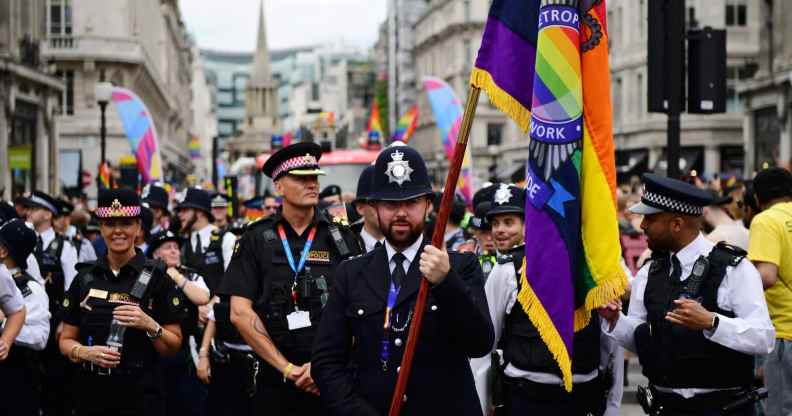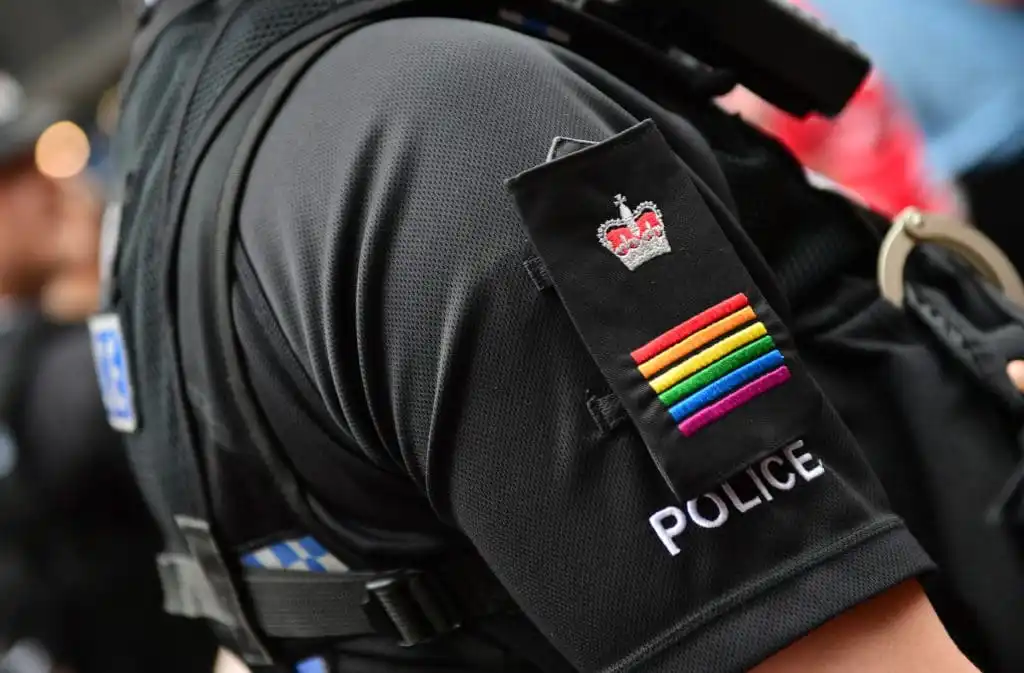Pride in London tells uniformed police to stay away in screeching U-turn

Members of the police march at Pride in London 2019. (Chris J Ratcliffe/Getty)
Pride in London has said uniformed police officers should not march in this weekend’s parade.
Members of London’s Metropolitan Police and other forces should no longer march in uniform at Pride in London, organisers said Thursday (30 June) – though officers are free to march in plain clothes.
The decision comes just days before the Pride in London 2022 march on Saturday (2 July), and after years of campaigning against police at Pride.
Pride in London told The Guardian: “We work hard to strike a balance between the very real and legitimate concerns from members of our community, and being as welcoming as we can.
“We agree that the police uniform undermines that balance, and as such we are aligned that it should not feature in our parade.”
On 14 June, LGBTQ+ groups had signed an open letter calling on Pride in London to ban police.
Organised by Lesbians & Gays Support the Migrants and signed by Gay Liberation Front, ACT UP London, African Rainbow Family and more, the letter demanded no police of Home Office presence, along with an end to the participation of corporations who facilitate policing.
It was accompanied by a series of posters lining the Pride in London route declaring “no cops at pride”. It seems organisers listened.
The move comes amid a major reckoning for the Met Police. The force was placed in special measures by the policing inspectorate, Her Majesty’s Inspectorate of Constabulary and Fire and Rescue Services, on Tuesday (28 June) for a raft of “serious or critical shortcomings”.
Among these failures is the force’s handling of the murders of four queer men by serial killer Stephen Port.
Days before the special measures were revealed, on 23 June, the Independent Office for Police Conduct (IOPC) announced that it is opening a fresh investigation into the police’s handling of the Port case.
The Met was already facing a crisis of trust as patterns of misogyny, racism and homophobia were exposed in a damning IOPC report, re-energizing calls for Pride in London to ban uniformed cops from marching.
Pride in London has long resisted these calls.
Pride in London voted to let police march in December 2020
The non-profit’s executive team voted in December 2020, and ratified in January 2021, to allow officers to march, according to confidential meeting notes between the team and Pride in London’s oversight body, the Community Advisory Board, on February 2021 seen by PinkNews. The entire board later quit over Pride in London’s well-documented issues with racism.
The vote was made to not “automatically exclude” the Met’s LGBTQ+ staff group from attending the Parade should it submit an application. This came after a Twitter campaign calling for its removal due to the “gross injustices against Black and queer people”.
At least 604 letters were sent to Pride in London calling for a uniformed police ban, the minutes say.
Pride in London let officers march on the condition that the Met (MPS) show an intention to regain the trust of Black LGBTQ+ people. The organisation asked for “the MPS to review their policy and practise to ensure that they do not reinforce racist behaviour/disproportionate outcomes for Black communities”.
“Clear and explicit consequences for officers found to be racist whilst in the line of duty, including improved and harsher prosecution rates has also been called for by PiL,” the minutes add.
Pride in London “rebuffed all allegations that the decision was influenced by the relationship that PiL have with the MPS” and intended to host “roundtables” between community groups and the force “to hold the MPS too account”.
It is unclear whether the Met followed through with Pride in London’s calls. Pride in London said in a statement at the time it would agree to work with police as part of an “inclusive process”.
The IOPC found continued racism riddling the ranks of the Met in its February 2022 report.
And the reinvestigation into the Met’s handling of the Stephen Port killings, LGBTQ+ campaigner Peter Tatchell said, showed “institutional homophobia is alive and kicking in the Metropolitan police”.
So Pride in London finally buckled.
Tatchell was among those to welcome the news.
“While there are many good officers, and they are welcome to march in civilian clothes, Pride needs to challenge the police as an institution, otherwise they will never reform,” he said, per The Guardian.

A police officer wearing rainbow epaulettes at Pride in London. (Getty/ Chris J Ratcliffe)
Stephen Port murdered at least four young men – Anthony Walgate, Gabriel Kovari, Daniel Whitworth and Jack Taylor – over a 16-month-long period between 2014 and 2015.
Officers failed to link Port, a then 41-year-old canteen chef as a bus depot, to the deaths of the men in their 20s despite their bodies all being found in the same churchyard near Port’s home in Barking, east London.
Nevertheless, police treated their deaths as unrelated cases of drug overdoes and suicide, even taking at face value a suicide note Port penned himself.
These blunders, which also included detectives ignoring the pleas of the victim’s relatives to look into Port, greatly hindered the investigation, an inquest found in 2021.
To Lesbian and Gay Support the Migrants, this is all the justification Pride in London should need for barring police officers from Pride.
A letter from the group to Pride in London on 14 June urged organisers to not only ban police but members of the Home Office for creating a “hostile environment” against queer refugees and asylum seekers.
“Due to our deep-rooted concerns with policing – and the history of Pride itself as resistance against police – it is time to end the practice of police participation in Pride each year,” the letter read.
“It is time to end the presence of police banners. Their presence not only offends by being undeserving, it deters others from celebrating with their community.
“While individual officers may or may not be queer, the organised presence of police at Pride en masse provides a platform to an institution that represses us.
“Having a police presence at Pride as well as patrolling Pride, makes Pride unsafe for our community.”
The Met agreed to no longer take part in Pride at an organisational level in April, the force told PinkNews. Instead, all officers who wish to take part will be asked to march out of uniform representing the Met LGBT+ Network.
The Met’s assistant commissioner Matt Jukes said in a statement: “I understand the concerns people have about the Met taking part in London’s Pride march. Everyone who is going to in the parade has asked to be part of Pride as a member of our LGBT+ staff network.
“I know that we have to work hard, with and for many LGBT+ Londoners to win back their trust. Amongst my LGBT+ colleagues taking part in Pride are people who have their own experiences of exclusion and prejudice. Despite the challenges some have faced individually, they want to be part of building a Met that all of London can be proud of.
“Pride is an opportunity for LGBT+ members of the Met to feel included in a wider community that is central to the rich diversity of London. At Pride, they will represent a staff network that itself has supported and challenged the Met to be more inclusive.
“I hope they will feel supported at the event at the same time as the Met as an organisation is determined to listen and respond to the concerns of LGBT+ individuals and organisations.”
PinkNews contacted Pride in London for comment.

